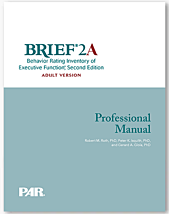
Behavior Rating Inventory of Executive Function, Second Edition – Adult Version [BRIEF2-A]
Assesses Adult Executive Functioning. Allows Adults and Those Closest to Them to Rate Their Executive Functions in Everyday Settings
For Ages: 18 – 99 years
Administration Time: 10-15 minutes
Format & Scoring: Online administration and scoring via PARiConnect; Paper and pencil
Authors: Robert M. Roth, PhD, Peter K. Isquith, PhD, Gerard A. Gioia, PhD
Manuals available in hard copy (book) or electronic version (e-Manual)
Online Forms, Reports, Kits & e-Manuals
All online resources including Forms, Reports, i-Admins, Kits and e-Manuals.
Printed Manuals
Physical printed manuals.
BRIEF2-A online i-Admin & Score Report – min order 5
BRIEF2-A online i-Admin & Interpretive Report – min order 5
BRIEF2-A online Professional e-Manual
BRIEF2-A Online Administration Kit with Score Reports
BRIEF2-A Online Administration Kit with Interpretive Reports
BRIEF2-A Professional Manual
description
BRIEF2A is a standardized rating scale that allows adults and knowledgeable informants (caregivers, adult children, partners/spouses) to rate executive function or self-regulation in that adult’s day-to-day setting. This allows clinicians to gather information from multiple sources, better equipping them to evaluate the complexities of executive function.
Now developed with the three-factor model found in the BRIEF2, which characterizes executive function deficits more clearly, the BRIEF2A offers new multirater and progress monitoring reports that allow for comparison between self and informant or over time, providing more valuable information to clinicians and leading to more targeted interventions.
The BRIEF2A Informant report is beneficial when assessing clients exhibiting cognitive deficits due to certain diagnoses (e.g., TBI, stroke, dementia) because it helps address concerns the clinician may have about the client’s ability to reliably rate their own executive function.
Features and benefits
- More reliable. The BRIEF2A has fewer items (75 to 70), and an updated normative sample based on the 2021 US census, and therefore more representative of the current population.
- More accurate. Updated to the 3-factor model found in the BRIEF2.
- More applicable. The U.S. population is living longer than ever before, the extended age range (up to 99 years) meets the demand for more assessment tools to evaluate older adults.
- New forms. The updated Spanish translation expands the utility of the BRIEF2A to be used with Spanish-speaking adults in various clinical settings.
- New reports. The new multirater and progress monitoring reports identify differences between raters and over time.
Test structure
The table below shows the BRIEF2A indexes and the corresponding clinical scales
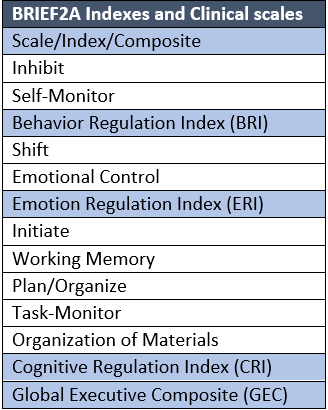
reports
The Multirater Report
allows the clinician to compare one self-report and one informant report on the same client. The report presents the scores side-by-side and graphs both sets of scores on a single profile, with indication of which scales and indexes have significant differences between raters as well as base rates of those differences in the normative samples.
The Progress Monitoring Report
provides these comparisons for ratings completed by the same rater on the same client over time, allowing you to compare two to four time points per report.
Both are available at no additional charge once each set of ratings has been scored.
multiple retest samples
There are two different retest samples included in BRIEF2-A.
The short retest sample (2-4 weeks) provides evidence for test–retest reliability of ratings, and it can be used to calculate reliable change indices (RCIs) over a short period, such as for acute effects of medication.
The longer retest sample (4-6 months) was used to create RCIs for a more clinically relevant retest timeframe, such as those used to evaluate response to therapeutic intervention or rehabilitation. BRIEF2A progress monitoring reports use the longer retest interval for flagging significant differences in ratings over time.
Technical information
The normative sample for the BRIEF2A consists of 1,637 individuals for the Self-Report Form and 1,605 individuals for the Informant Report Form.
The BRIEF2A Professional Manual includes profiles and base rates of scale elevations for adults with ADHD, ASD, LD, schizophrenia spectrum disorder, mild TBI with persisting symptoms, moderate to severe TBI, and Parkinson’s disease.
Sample Reports
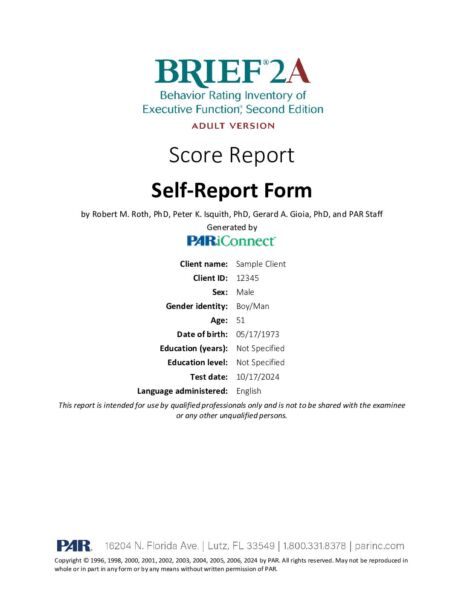 brief2a-self-report-form-score-report-sample
brief2a-self-report-form-score-report-sample![]() Download
Download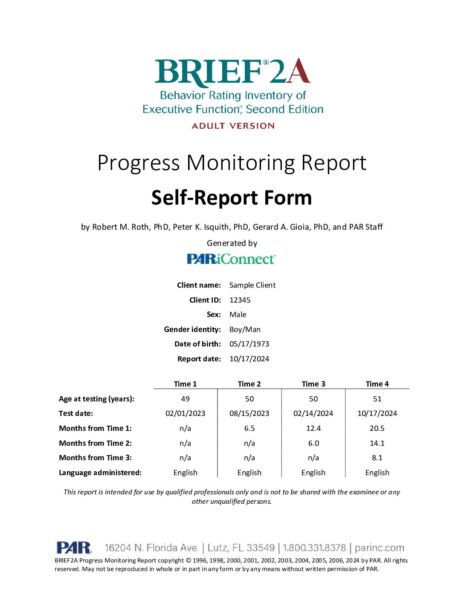 brief2a-self-report-form-progress-monitoring-report-sample
brief2a-self-report-form-progress-monitoring-report-sample![]() Download
Download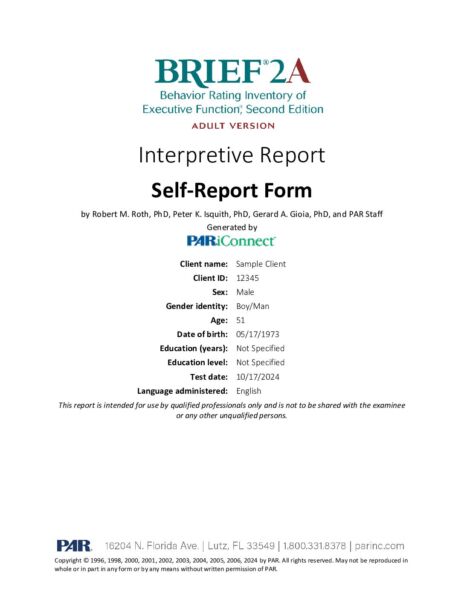 brief2a-self-report-form-interpretive-report-sample
brief2a-self-report-form-interpretive-report-sample![]() Download
Download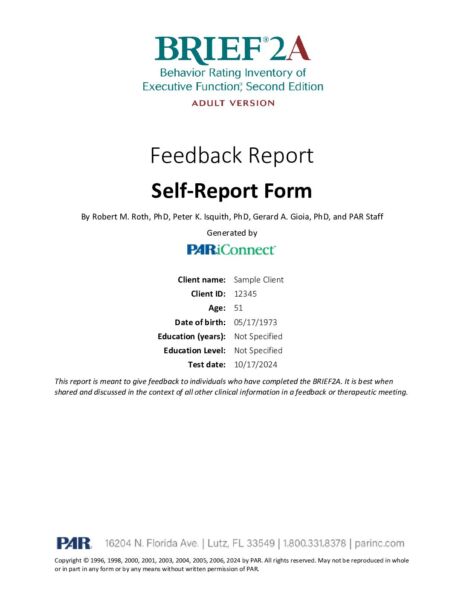 brief2a-self-report-form-feedback-report-sample
brief2a-self-report-form-feedback-report-sample![]() Download
Download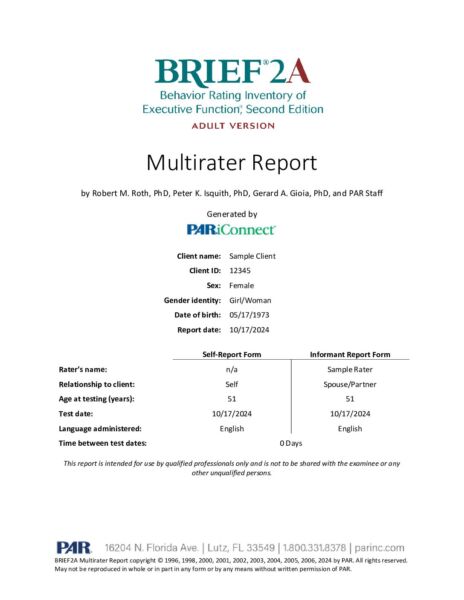 brief2a-multirater-report-sample
brief2a-multirater-report-sample![]() Download
Download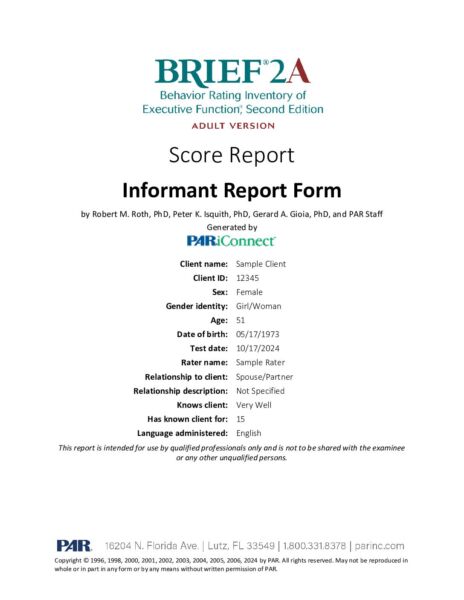 brief2a-informant-report-form-score-report-sample
brief2a-informant-report-form-score-report-sample![]() Download
Download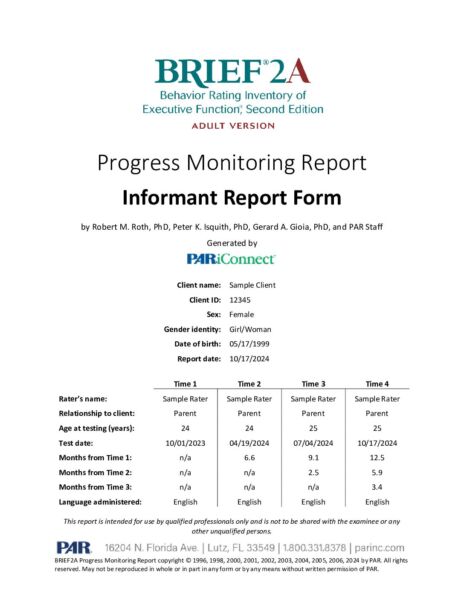 brief2a-informant-report-form-progress-monitoring-report-sample
brief2a-informant-report-form-progress-monitoring-report-sample![]() Download
Download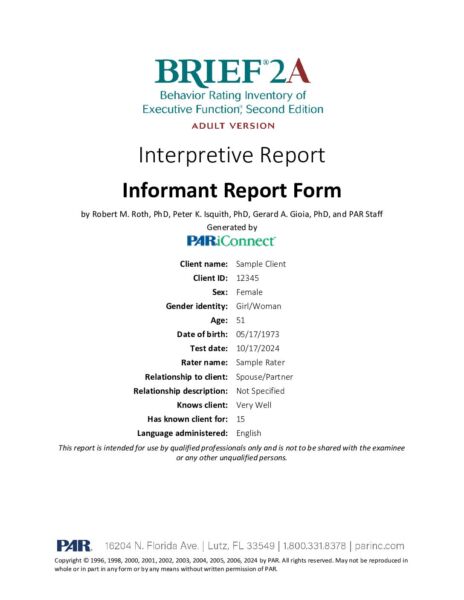 brief2a-informant-report-form-interpretive-report-sample
brief2a-informant-report-form-interpretive-report-sample![]() Download
Download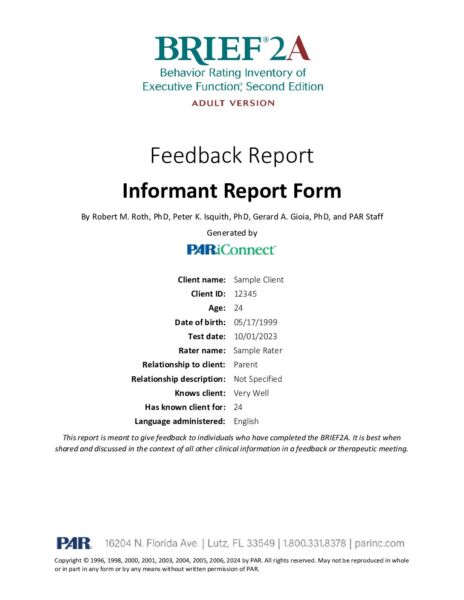 brief2a-informant-report-form-feedback-report-sample
brief2a-informant-report-form-feedback-report-sample![]() Download
Download



